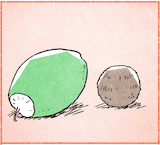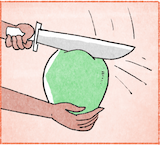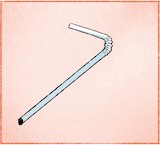



นี้คืออี่หยัง นี้คือบักพ้าว อันนี้เป็นบักพ้าว
บักพ้าวสองน่วย วางเฮียงกันอยู่ข้างๆ กันนั้นหละ มีสองน่วยข้อหล้อ
บักพ้าวสองน่วยนี้เป็นบักพ้าวอี่หยัง เป็นบักพ้าวคือกันบ่ บ่ เป็นบักพ้าวคนละอย่าง
อันหนึ่งเป็นบักพ้าวอ่อน วางอยู่ฝั่งซ้ายมือหนะเป็นบักพ้าวอ่อน
วางอยู่ฝั่งขวามือหนะเป็นบักพ้าวแก่ เป็นน่วยสีน้ำตาน อาดสิแก่กะได้ มันเถ้าแล้วนั้นหละความหมาย
บักพ้าวแต่ละอย่างกะแตกต่างกันไป บักพ้าวอ่อน เนี้ยมันกะอ่อน บักพ้าวแก่ เนี้ยมันกะแข็ง นวนมันนั้นหละ นวนมันกะแข็ง บักพ้าวอ่อนนวนมันกะอ่อน
บักพ้าวอ่อนกะเอาไว้ถ้าเฮ็ดขะหนม หลือเอาไว้ถ้ากินเหล้น บักพ้าวแก่หลือบักพ้าวเถ้านั้นหละ กะเอาไว้ถ้าแนวกิน เอาไว้ถ้าเฮ็ดของหวาน หลือเอาไว้เฮ็ดอี่หยังอย่างอื่นกะได้
แต่ละอย่างกะมีปะโยดหลายอย่าง แต่ละปะโยดกะแตกต่างกันออกไป
5
เขากำลังเฮ็ดหญัง เขากำลังผ่าบักพ้าว
มีคนกำลังผ่าบักพ้าวอยู่
เขาผ่าบักพ้าวจั่งใด เขาเอาอี่หยังผ่าบักพ้าว เขาใซ้อี่หยังผ่าบักพ้าว เขาใซ้มีดผ่าบักพ้าว เขากำลังปอก กำลังผ่าบักพ้าวอยู่
เขาใซ้มือของเขาจับบักพ้าวข้างหนึ่ง อีกข้างหนึ่งเขาจับมีด แล้วกะผ่าบักพ้าว หลือปอกเปียกบักพ้าวนั้นหละ
เบิ่งซงแล้วเป็นตาญากบ่ เบิ่งซงแล้วเป็นตาผ่าญากและปอกญากบ่ กะญากอยู่ ขั้นคนบ่เคยเฮ็ดกะเฮ็ดบ่เป็น ขั้นคนเคยเฮ็ดกะเฮ็ดเป็น มันกะญากพอสมควนอยู่ แต่กะบ่ญากหลาย ขั้นคนอยากเฮ็ดกะเฮ็ดได้ ขั้นคนบ่อยากเฮ็ดกะเฮ็ดบ่ได้
6
นี้คืออี่หยัง นี้คือหลอด หลอดไว้ถ้าดูดน้ำ หลือดูดอี่หยังกะได้ที่มันเป็นน้ำ
หลอดอันนี้เฮ็ดจากอี่หยัง หลอดนี้เฮ็ดจากพะสะติก
เฮ็ดจากพะสะติก มันเฮ็ดจากเหล็กเฮ็ดจากไม้บ่ได้
หลอดอันนี้กะมีปะโยดอย่างเดียวนั้นหละ เอาไว้ถ้าดูดน้ำ ดูดน้ำโค่ก ดูดน้ำส้ม ดูดกาแฟ หลือดูดน้ำเป่านี้หละ
ส่วนมากพุใดสิใซ้หลอดนี้ กะมีหลายคน เพาะว่ามันสิสะอาดกว่ากัน ขั้นไปกินล้านอาหาน เขากะสิใซ้หลอดดูด เพาะว่าปากเฮาจั่งบ่ได้ติดกับแก้ว เฮากะใซ้แค่หลอดนี้ ดูดกินน้ำในแก้วนั้นกะพอ แล้วมันกะสิสะอาดกว่ากัน
7
เขากำลังเฮ็ดหญัง เขากำลังกินบักพ้าว
เขากำลังดูดน้ำบักพ้าวอยู่
มีพุหญิงพุหนึ่งนั้นหละ เขากำลังยืนจับบักพ้าว กำลังดูดกินน้ำบักพ้าวอยู่
เขาใซ้อี่หยังดูดน้ำบักพ้าว เขาใซ้หลอดดูดน้ำบักพ้าว เอาหลอดเสียบเข้าไปในบักพ้าว แล้วกะดูดกินน้ำมัน
น้ำบักพ้าวมันแซบบ่ กะแซบอยู่ แซบหลาย แซบบักคักหนึ่ง เพาะว่าคนมักกินน้ำบักพ้าว แต่ว่าขั้นน้ำบักพ้าวอ่อน มันกะสิแซบ แต่ว่าขั้นน้ำบักพ้าวแก่ หลือบักพ้าวเถ้า มันกะสิบ่แซบ
Link to overview page
Link to dictionary
| Isaan | Pronunciation | Tones | Thai | English/Notes |
|---|---|---|---|---|
| นี้ | ni: | HF | นี้ | 1. this 2. here |
| คือ | khʉ: | HR | คือ | 1. to be, to resemble, like, as 2. why {บักหล้าคือบ่เก็บโต่ะแน่ = [addressing a young boy] Why haven't you cleared the table?} |
| อี่หยัง | i:-yaŋ | H-M | อะไร | 1. what {นี้คืออี่หยัง = What is this?} {มื้อนี้เจ้าเฮ็ดอี่หยัง = What are you doing today?} {กินเข้างายกับอี่หยัง = What did you have for breakfast?} 2. something, anything, (in negations) nothing {บ่ต้องเฮ็ดอี่หยังอีกเลยนอกจากใส่ปุย = [we] don't need to do anything besides adding fertilizer} |
| บักพ้าว | bak-pha:o | M-HF | มะพร้าว | coconut |
| อัน | an | M | อัน | 1. thing, object 2. general clf. for objects |
| เป็น | pen | M | เป็น | 1. to be, to exist 2. to be able to 3. to suffer, sth. happens to 4. เป็นหญัง[...]คือ in initial position: why? {เป็นหญังเขากะคือแปงฟัน = Why is he brushing his teeth?} {เป็นหญังเคี่ยงบินมันคือสิตก = Why is the airplane falling down?} |
| สอง | sɔ:ŋ | M | สอง | two |
| น่วย | nu:ai | H | ลูก, ผล | clf. for the fruits (e.g., banana, coconut, lime, papaya, watermelon), vegetables (e.g., chilis), eggs, mountains, the sun |
| วาง | wa:ŋ | HR | วาง | to place, to set/put down {โทละสับ/phone: วางสาย = to hang up} {มีเกิบวางอยู่ในก่อง = there are shoes in the box} {มือข้างหนึ่งเขาวางอยู่เทิงโต่ะ = he's put one of his hands on the table} |
| เฮียง | hi:aŋ | HR | เรียง | 1. to line up, to stand in a row {มีพุซายสามคนยืนเฮียงกันอยู่ = three men are standing in a row} 2. to arrange Notes: see also เลียง |
| กัน | gan | M | กัน | mutual, each other, with another, together {เขากำลังนั่งเว้ากัน = they're sitting and talking} {เขาสองคนฮักกัน = they love each other} {ปาสองโตนี้ ใหญ่ห่างกันหลายบ่ = These two fish here, are they very different in size (from each other)?} {ต่างกัน = to be different (from each other)} {ก่องอันไหนหนักกว่ากัน = Which box is heavier (than the other(s))?} |
| อยู่ | yu: | H | อยู่ | 1. to be (located) at 2. yet, still 3. auxiliary indicating continuous or progressive action {ทอดปาอยู่ในกะทะ = (in the process of) frying a fish in the pan} {แม่กำลังเมี้ยนเฮียนอยู่ = mother is cleaning/tidying up the house} |
| ข้าง | kha:ŋ | LF | ข้าง | 1. side {มีหูจับสองข้าง = there are handles on both sides} 2. next to {วางอยู่ข้างๆ ก่องใบใหญ่ = it's placed next to the large box} {เขายืนอยู่ข้างๆ อีกพุหนึ่ง = he's standing next to another person} 3. clf. for body parts which come in pairs (eyes, ears, legs etc.) {เขามีตาสองข้าง = she has two eyes} |
| นั้นหละ | nan-la | HF-M | นั่นแหละ | auxiliary for emphasis at the end of a phrase |
| มี | mi: | HR | มี | 1. to have 2. there is |
| ข้อหล้อ | khɔ:-lɔ: | LF-LF | เท่านั้น, ขนาดนั้น, น้อยๆ | only {ต้นไม้มีต้นเดียว ต้นเดียวข้อหล้อ = there's one tree, only one tree} {มีบ้านหลังเดียวข้อหล้อ = there's only one house} |
| คือกัน | khʉ:-gan | HR-M | เหมือนกัน | 1. also, likewise, similarly {ยินดีที่ได้ฮู้จักคือกันคับ = Nice to meet you too!} 2. in negative sentences: either {บ่ลู้คือกัน = I don't know either} {จักคือกัน = I don't know (either)} |
| บ่ | bɔ: | H | ไม่ | 1. no, not 2. question particle, transforming a statement into a question Notes: spelling exception in line with common usage on social media |
| คนละ | khon-la | HR-H | คนละ | different, in a different manner {ไก่กับหมา เลี้ยงคนละแบบ = chicken and dogs are raised differently} {อยู่คนละปะเทด = [they] are in different countries} {คนละแบบ = different(ly), in a different manner} |
| อย่าง | ya:ŋ | H | อย่าง | type, kind, sort, category |
| หนึ่ง | nʉŋ | H | หนึ่ง | 1. one 2. after adjective: intensifier {บักคักหนึ่ง = very much} {อันบักใหญ่หนึ่ง = very large}, or attenuates the meaning {กะดาดมันแผ่นน้อยๆ หนึ่ง = the piece of paper is [relatively] small} |
| อ่อน | ɔ:n | H | อ่อน | 1. soft 2. young |
| ฝั่ง | faŋ | H | ฝั่ง | 1. side 2. river/canal bank, shore |
| ซ้าย | sa:i | HF | ซ้าย | left |
| มือ | mʉ: | HR | มือ | 1. hand 2. front leg/paw (e.g., of a cat) |
| หนะ | na | M | final particle | |
| ขวา | khwa: | M | ขวา | right |
| แก่ | gɛ: | H | แก่ | 1. old 2. dark |
| สี | si: | M | สี | 1. color 2. colored pencil, crayon |
| น้ำตาน | na:m-ta:n | HF-M | น้ำตาล | color: brown |
| อาด | a:t | LF | อาจ | 1. might, may, will 2. likely |
| สิ | si | M | จะ | future tense auxiliary {เขากำลังสิตื่น = he's about to wake up} {สิไปตะหลาด = [I'm] going to the market} |
| กะ | ga | M | ก็ | 1. then, consequently 2. also |
| ได้ | dai | HF | ได้ | 1. can 2. to get, to obtain 3. before verb: indicating past tense 4. บ่ได้ + verb: not |
| มัน | man | HR | มัน | it (also used to refer to people) |
| เถ้า | thao | LF | แก่, เฒ่า | age: old |
| แล้ว | lɛ:o | HF | แล้ว | 1. finished 2. already 3. and then, and next (especially แล้วกะ) 4. auxiliary for past tense |
| ความหมาย | khwa:m-ma:i | HR-M | ความหมาย | meaning |
| แต่ละ | tɛ:-la | H-H | แต่ละ | each {มือแต่ละข้างกะสิมีห้านิ้ว = each hand has five fingers} {แต่ละมื้อๆ = each day} |
| แตกต่าง | tɛ:k-ta:ŋ | LF-H | แตกต่าง | different, dissimilar |
| ไป | pai | M | ไป | 1. to go 2. auxiliary indicating action extending into the future |
| เนี้ย | ni:a | HF | เนื้อ | meat Notes: pronunciation: also realized as เนื้อ |
| แข็ง | khɛŋ | M | แข็ง | hard, strong |
| นวน | nu:an | HR | เนื้อ | meat of a fruit |
| เอา | ao | M | เอา | to take, to give {เขากำลังเอาก่องไปซั่ง = he's taking the boxes to weigh them} {หมอกำลังเอายาให้คนป่วยกิน = the doctor is giving medicine to the patient} {เอาไว้ถ้า = is for, is used for, has the purpose of} |
| ไว้ถ้า | wai-tha: | HF-LF | usually in a positive statement or answer: is for, is used for, has the purpose of {กะทะมีไว้ถ้าทอด = a pan is for frying} {น้ำบักนาวมีไว้ถ้าปุงอาหาน = lime juice is used to season food} {ปากกามีไว้ถ้าเขียน = a pen is for writing} {กะเทียมเอาไว้ถ้าเฮ็ดแนวกิน = garlic is used to make food} {ขาเอาไว้ถ้าญ่าง = legs are for walking} {เกิบเอาไว้ถ้าใส่ = shoes are for wearing} Notes: see also ไว้ |
|
| เฮ็ด | het | H | ทำ | to do, to make |
| ขะหนม | kha-nom | M-M | ขนม | sweets |
| หลือ | lʉ: | M | หรือ | or |
| กิน | gin | M | กิน | to eat, to consume, to use |
| เหล้น | len | LF | เล่น | 1. to play, to enjoy oneself with, to do something for pleasure {เหล้นลูกบอน = to play ball} {เหล้นเกม = to play a game/games} {เหล้นน้ำ = to play with/in the water} {นั่งเหล้น = to sit} {กินเหล้น = to eat (as a snack), to snack} {เหล้นโน่ดบุ่ก = to use a laptop (for entertainment or work)} 2. to drop by, to spend time with, to come to visit {บ่ได้มาเฮ็ดหญัง มาเหล้นซื่อๆ = I've not come to do anything in particular, I'm just dropping by} |
| แนวกิน | nɛ:o-gin | HR-M | อาหาร | food {เฮ็ดแนวกิน = to prepare food} {ตำบักหุ่งเนี้ยกะสิเป็นแนวกิน = papaya salad is (a kind of) food} |
| ของหวาน | khɔ:ŋ-wa:n | M-M | ของหวาน | sweet, candy, dessert |
| ไว้ | wai | HF | ไว้ | 1. to keep, to put, to place, to retain, to save, to reserve {เขาเอาหัวของเขาไว้ใส = Where does she put her head?} {หมาสิเลี้ยงไว้บ้าน = dogs are kept/raised in the house} {ไก่เลี้ยงไว้ในคอก = chicken are kept/raised in a coop} {หน้ามันบังไว้ = the face is covered/not visible} {เขาเอาโทละสับวางไว้หู = he holds the phone to his ear} 2. for {นาลิกาปุกมีไว้เฮ็ดหญัง = What is an alarm clock for?} {หม้อเอาไว้เฮ็ดแนวกิน = a pot is used to make food} {ก่องเอาไว้เฮ็ดหญัง ก่องเอาไว้ใส่ของ = What is the box for? It's for putting in stuff.} Notes: see also ไว้ถ้า |
| อื่น | ʉ:n | H | อื่น | other |
| ปะโยด | pa-yo:t | M-LF | ประโยชน์ | 1. benefit 2. useful |
| หลาย | la:i | M | เยอะ, มาก | many, much, very |
| ออก | ɔ:k | LF | ออก | 1. to go out, to leave 2. out |
| เขา | khao | M | เขา | personal pronoun: he, she |
| กำลัง | gam-laŋ | M-HR | กำลัง | auxiliary indicating continuous or progressive action |
| หญัง | ɲaŋ | M | อะไร, เป็นหญัง = ทำไม | 1. what {เขากำลังเฮ็ดหญัง = What is he doing?} {ธูปเอาไว้เฮ็ดหญัง = What are incense sticks for?} 2. something, anything, (nothing) 3. เป็นหญัง[...]คือ in initial position: why {เป็นหญังเขาคือใส่บักพิกลงไปในกวยเตียว = Why is he putting chili in [his] noodle soup?} {เป็นหญังหน้าต่างมันคือเปิด = Why is the window open?} {เป็นหญังมันคือมีควนไฟ = Why is there smoke?} |
| ผ่า | pha: | H | ผ่า | 1. to flash (lightning) {ฟ้าผ่ามันผ่ามันสิเสียงดังคัก = when a flash of lightning flashes, it's very loud} 2. to cut lengthwise, to cut open {เขาผ่าแตงโมน่วยนี้ไป่ = Has he cut this watermelon yet?} {เขากำลังผ่าบักพ้าว = she's cutting the coconut open} 3. to cross through, to go across |
| คน | khon | HR | คน | person, people |
| จั่งใด | jaŋ-dai | H-M | ยังไง, แบบไหน | how, in what manner {บักนาวมันมีลดซาดจั่งใด = Lime fruits have what kind of taste?} {เขาปิดแอจั่งใด = How is he switching off the A/C?} {เทียนใซ้จั่งใด = How's a candle used?} {สิใซ้จั่งใด = how is [it] used?} |
| ใซ้ | sai | HF | ใช้ | to use |
| มีด | mi:t | HF | มีด | knife |
| ปอก | pɔ:k | LF | ปอก | 1. to peel 2. to knock an egg open |
| ของ | khɔ:ŋ | M | ของ | of, belonging to |
| จับ | jap | M | จับ | 1. to grasp, to hold {เขาจับมือกัน = they're holding hands} {เขายืนจับไอติมอยู่ = she's standing, holding an ice cream} 2. to catch, to arrest {จับพุล้าย = to arrest a criminal} |
| อีก | i:k | LF | อีก | 1. more, again 2. other, another |
| เปียก | pi:ak | LF | เปลือก | shell, peel, outer skin Notes: pronunciation: also realized as เปือก |
| เบิ่ง | bəŋ | H | ดู | 1. to look at, to see, to watch {เบิ่งโทละทัด = to watch TV} {เบิ่งหนัง = to watch a movie} 2. to guess {เบิ่งซงแล้ว ... = [I] guess / from what it looks like ...} |
| ซง | soŋ | HR | ทรง | 1. shape, form 2. as if, like Notes: translation to be confirmed |
| ตา | ta: | M | ตา | as a prefix: likely, worthy, fit for (like Thai น่า-) {ตาฮัก = lovely/cute} {ตาสะออน = praiseworthy} {ตาหวาน = (of ice cream) [likely to be] sweet} {ตาอยู่ = to be a good place to be} Notes: see also various entries for ตา-, e.g., ตาแซบ, ตาพู่ฮ้าย, ตาย้าน, ตาอยากหัว, ตาฮัก, ตามีแฮง |
| ญาก | ɲa:k | HF | ยาก | difficult, hard |
| และ | lɛ | H | และ | and |
| ขั้น | khan | LF | เมื่อ | when, if |
| เคย | khə:i | HR | เคย | once, ever |
| พอสมควน | phɔ:-som-khu:an | HR-M-HR | พอสมควร | moderately, fairly, rather |
| แต่ | tɛ: | H | แต่ | 1. but {แต่บ่ต่างกันหลาย = but not very different} {แต่บ่ลู้ว่าเขาญ่างมาแต่ใส = but [I] don't know where he's coming from, see also: แต่ว่า} 2. only {ตอนนี้มีแต่ขี้ฝ้า = now there are only clouds} |
| อยาก | ya:k | LF | อยาก | to want, to wish |
| หลอด | lɔ:t | LF | หลอด | 1. tube 2. drinking straw 3. clf. for tubes (e.g., toothpaste, neon tube), drinking straws |
| ดูด | du:t | LF | ดูด | to suck, to absorb |
| น้ำ | na:m | HF | น้ำ | 1. water 2. drink, soft drink, juice |
| ที่ | thi: | H | ที่ | 1. that, which {คนที่ยืนอยู่ฝั่งขวา = the person which is standing on the right = the person standing on the right} {เว้าคำที่บ่สุพาบ = to speak words which are impolite = to speak impolitely} 2. for ordinal numbers {ที่สาม = third} |
| จาก | ja:k | LF | จาก | 1. from {... เฮ็ดมาจากอี่หยัง = ... is made from what?} 2. to depart |
| พะสะติก | pha-sa-tik | H-M-M | พลาสติก | plastic |
| เหล็ก | lek | M | เหล็ก | iron, steel, metal |
| ไม้ | mai | HF | ไม้ | wood, tree |
| อย่างเดียว | ya:ŋ-di:ao | H-M | อย่างเดียว | only |
| น้ำโค่ก | na:m-kho:k | HF-H | น้ำโค้ก | coke Notes: tone to be verified |
| ส้ม | som | LF | ส้ม | 1. fruit: orange 2. color: orange |
| กาแฟ | ga:-fɛ: | M-HR | กาแฟ | coffee |
| น้ำเป่า | na:m-pao | HF-H | น้ำเปล่า | drinking water |
| นี้หละ | ni:-la | HF-M | นี่แหละ | auxiliary for emphasis at the end of a phrase |
| ส่วนมาก | su:an-ma:k | H-HF | ส่วนมาก | mostly, usually, generally |
| พุใด | phu-dai | H-M | ใคร | 1. who {มีพุใดโทมากะบ่ลู้ = I don't know who has called} {ห้องนอนของพุใด = whose bedroom (is this)? } 2. someone, somebody, anybody, in negative context: nobody {บ่มีพุใดอยู่กับเขาเลย = there's nobody with him} |
| เพาะว่า | phɔ-wa: | H-H | เพราะว่า | because |
| สะอาด | sa-a:t | M-LF | สะอาด | clean |
| กว่า | gwa: | H | กว่า | more, more than, comparative: as, than |
| ล้านอาหาน | la:n-a:-ha:n | HF-M-M | ร้านอาหาร | restaurant |
| ปาก | pa:k | LF | ปาก | mouth |
| เฮา | hao | HR | เรา | 1. personal pronoun: we 2. personal pronoun: I |
| จั่ง | jaŋ | H | ค่อย (?) | then, afterwards {ต้องใซ้น้ำมันพ้อม มันจั่งสิทอดได้ = one needs to use oil as well, then one can fry [food]} |
| ติด | tit | M | ติด | 1. to be attached to, to be on/at {สะวิดเปิดไฟติดอยู่ข้างฝาบ้าน = the light switch is on the wall} {มันสิมีน้ำติดอยู่โตของเขา = there is water on his body} 2. to stick (to), to attach (to) |
| กับ | gap | M | กับ | 1. and {ลุงกับป้า = uncle and aunt} {กวยเตียวหมูกับกวยเตียวไก่ = noodle soup with pork and noodle soup with chicken} 2. with, to {ค้ายๆ กับคำว่า ... = similar to the word ...} 3. prefix in front of foods {กับเข้า = side dishes eaten with rice} {เขากินกับกวยเตียว = he's eating noodle soup} |
| แก้ว | gɛ:o | HF | แก้ว | glass {ขวดแก้ว = glass bottle} |
| แค่ | khɛ: | H | แค่ | only |
| ใน | nai | HR | ใน | in, within |
| นั้น | nan | HF | นั้น | that, there |
| พอ | phɔ: | HR | พอ | 1. just when, just after, as soon as 2. enough, adequate |
| พุหญิง | phu-ɲiŋ | H-M | ผู้หญิง | woman, female |
| พุ | phu | H | ผู้ | 1. person 2. clf. for people {พุหญิงพุหนึ่ง พุซายพุหนึ่ง = a woman, a man} {ซู่พุซู่คน = everybody} {พุหนึ่งโตจ่อยๆ พุหนึ่งโตบักอ้วนหนึ่ง = one person is slim, the other is fat} Notes: pronunciation: also realized as พู่- |
| ยืน | yʉ:n | M | ยืน | to stand |
| เสียบ | si:ap | LF | เสียบ | to insert, to put in {เสียบปั่ก = to plug in} {ใซ้ซ้อนส้อมเสียบลูกซิ้น = to pick up meat balls with a fork} |
| เข้า | khao | LF | เข้า | to enter, to go inside, to come/go in/on {เข้าห้องน้ำ = to go to the bathroom} {เข้านอน = to go to bed} {ขี่เลียเข้าไปเกาะ = to take a boat to go on an island} |
| แซบ | sɛ:p | HF | อร่อย | 1. food: tasty {กวยเตียวมันแซบบ่ = Is the noodle soup tasty?} 2. sleep: well {เป็นตานอนแซบคัก = it looks as if she's sleeping very well} |
| บักคักหนึ่ง | bak-khak-nʉŋ | M-H-H | intensifier: very, very much (variant of คัก) | |
| มัก | mak | H | ชอบ | to like, to love, to want, to desire |
| แต่ว่า | tɛ:-wa: | H-H | แต่ว่า | 1. but 2. only {ฮู้แต่ว่าเขายืนอยู่พุเดียว = I only know that he's standing there by himself} |